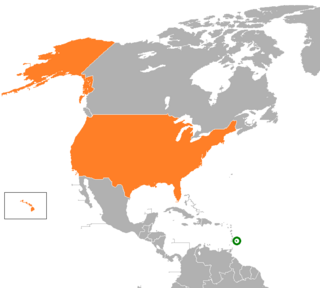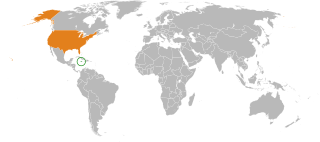
The economy of the Bahamas is dependent upon tourism and offshore banking. The Bahamas is the richest country in the West Indies and is ranked 14th in North America for nominal GDP. It is a stable, developing nation in the Lucayan Archipelago, with a population of 391,232 (2016). Steady growth in tourism receipts and a boom in construction of new hotels, resorts, and residences had led to solid GDP growth for many years. The slowdown in the Economy of the United States and the September 11 attacks held back growth in these sectors from 2001 to 2003.
The economy of Eswatini is fairly diversified. Agriculture, forestry and mining account for about 13 percent of Eswatini's GDP whereas manufacturing represent 37 percent of GDP. Services – with government services in the lead – constitute the other 50 percent of GDP.

The Cuban Liberty and Democratic Solidarity (Libertad) Act of 1996, Pub.L. 104–114 (text)(PDF), 110 Stat. 785, 22 U.S.C. §§ 6021–6091) is a United States federal law which strengthens and continues the United States embargo against Cuba. The act extended the territorial application of the initial embargo to apply to foreign companies trading with Cuba, and penalized foreign companies allegedly "trafficking" in property formerly owned by U.S. citizens but confiscated by Cuba after the Cuban revolution. The act also covers property formerly owned by Cubans who have since become U.S. citizens.
The Caribbean Basin Trade Partnership Act (CBTPA) is a law adopted by the U.S. Government in October 2000 to delineate enhanced trade preferences and eligibility requirements for the 24 beneficiary countries of the Caribbean Basin region.
The Lomé Convention is a trade and aid agreement between the European Economic Community (EEC) and 71 African, Caribbean, and Pacific (ACP) countries, first signed in February 1975 in Lomé, Togo.
The Caribbean Basin Initiative (CBI), a trade initiative initiated by the 1983 Caribbean Basin Economic Recovery Act (CBERA), is a United States program. The CBI came into effect on January 1, 1984, and aimed to provide several tariff and trade benefits to many Central American and Caribbean countries. Provisions in the CBERA prevented the United States from extending preferences to CBI countries that it judged to be contrary to its interests or that had expropriated American property.
The Foreign Agricultural Service (FAS) is the foreign affairs agency with primary responsibility for the United States Department of Agriculture's (USDA) overseas programs — market development, international trade agreements and negotiations, and the collection of statistics and market information. It also administers the USDA's export credit guarantee and food aid programs and helps increase income and food availability in developing nations by mobilizing expertise for agriculturally led economic growth. The FAS mission statement reads, "Linking U.S. agriculture to the world to enhance export opportunities and global food security," and its motto is "Linking U.S. Agriculture to the World."

The African Growth and Opportunity Act, or AGOA is a piece of legislation that was approved by the U.S. Congress in May 2000. The stated purpose of this legislation is to assist the economies of sub-Saharan Africa and to improve economic relations between the United States and the region. After completing its initial 15-year period of validity, the AGOA legislation was extended on 29 June 2015 by a further 10 years, to 2025.
The Caribbean-Canada Trade Agreement known as ("CARIBCAN") is a Canadian government programme, established in 1986 by the Parliament of Canada. The agreement was created to promote trade, investment and provide industrial cooperation through the preferential access of duty-free goods from the countries of the Commonwealth-Caribbean to the Canadian market.
Economic Partnership Agreements are a scheme to create a free trade area (FTA) between the European Union and the African, Caribbean and Pacific Group of States (ACP). They are a response to continuing criticism that the non-reciprocal and discriminating preferential trade agreements offered by the EU are incompatible with WTO rules. The EPAs date back to the signing of the Cotonou Agreement. The EPAs with the different regions are at different states of play. In 2016, EPAs with three African Regional Economic Communities were to be signed but faced challenges.

The United States and Barbados have had cordial bilateral relations since Barbados' independence in 1966. The United States has supported the government's efforts to expand the country's economic base and to provide a higher standard of living for its citizens. Barbados is a beneficiary of the U.S. Caribbean Basin Initiative. U.S. assistance is channeled primarily through multilateral agencies such as the Inter-American Development Bank and the World Bank, as well as the U.S. Agency for International Development (USAID) office in Bridgetown.

Bilateral relations have been established between the Co-operative Republic of Guyana and the United States of America.

Haiti–United States relations are bilateral relations between Haiti and the United States.

The United States maintains close and productive relations with Jamaica.

The economy of Belize is a small, essentially private enterprise economy that is based primarily on agriculture, tourism, and services. The cultivation of newly discovered oil in the town of Spanish Lookout has presented new prospects and problems for this developing nation. Belize's primary exports are citrus, sugar, and bananas. Belize's trade deficit has been growing, mostly as a result of low export prices for sugar and bananas.
The Third Border Initiative (TBI) is an area of policy concerning United States and the Caribbean region. The phrase was especially made popular by the administration of US president George W. Bush. The Third Border Initiative was a reference to the Caribbean region's adjacent placement to the United States. The policy is the ideology that behind Canada and Mexico the Caribbean region is a sea-based border of the United States.
The Partnership for Prosperity and Security in the Caribbean (PPS) is a regional-level dialogue with the stated purpose of providing greater cooperation on security and economic issues. The Partnership was founded in Bridgetown, Barbados on March 10, 1997 by the Governments of the United States of America, Antigua and Barbuda, the Commonwealth of The Bahamas, Barbados, Belize, the Commonwealth of Dominica, the Dominican Republic, Grenada, the Co-operative Republic of Guyana, the Republic of Haiti, Jamaica, the Federation of St. Kitts and Nevis, Saint Lucia, St. Vincent and the Grenadines, the Republic of Suriname and the Republic of Trinidad and Tobago.

Caribbean Basin Economic Recovery Act of 1983 (CBERA) — P.L. 98-67, Title II, authorized unilateral preferential trade and tax benefits for eligible Caribbean countries, including duty-free treatment of eligible products.
The U.S.–China Relations Act of 2000 is an Act of the United States Congress that granted China permanent normal trade relations (NTR) status when China becomes a full member of the World Trade Organization (WTO), ending annual review and approval of NTR. It was signed into law on October 10, 2000 by United States President Bill Clinton. The Act also establishes a Congressional-Executive Commission to ensure that China complies with internationally recognized human rights laws, meets labor standards and allows religious freedom, and establishes a task force to prohibit the importation of Chinese products that were made in forced labor camps or prisons. The Act also includes so-called "anti-dumping" measures designed to prevent an influx of inexpensive Chinese goods into the United States that might hurt American industries making the same goods. It allows new duties and restrictions on Chinese imports that "threaten to cause market disruption to the U.S. producers of a like or directly competitive product."

The FRIENDSHIP Act of 1993 was enacted as a law of the United States enhancing prior statutory provisions which govern international relations between the former Republics of the Soviet Union and United States during the Cold War. The Act of Congress reformed United States statutes related to:







